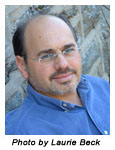Don Silver: Writing Back from the Brink
 Don Silver is the author of Backward-Facing Man, a novel set during the social upheavals of the 1960s and early ’70s. In this note to Beatrice readers, he explains how he came to write fiction when his own life was turned end over end.
Don Silver is the author of Backward-Facing Man, a novel set during the social upheavals of the 1960s and early ’70s. In this note to Beatrice readers, he explains how he came to write fiction when his own life was turned end over end.
Just before my family’s business collapsed, I’d separated from my wife of nineteen years, and was therefore unable to distinguish between those two great liberations. The company, the girl I married and I had, all three of us, since high school, been a strange ménage a trois—and the splitting apart was both wrenching and inevitable. We’d become as incompatible as different plaids.
The company had once been the biggest and most innovative in its little field, but by the 1980s, was in precipitous decline. I was named President & CEO the same year a vicious family feud was settled for a lot of money, money that was sorely needed to modernize the business. We tried our hardest, but after seven years, the bank modified our loan agreement, hired a turnaround manager and insisted we offer up the company for sale.
The breakup of the marriage was more my doing, or undoing, depending on how you look at it. I was almost forty. My ambition had fizzled and seeing my diminishing chances of being an accomplished athlete, tycoon or virtuoso guitarist humbled, and then hobbled, me, which I’m sure made me a lot less attractive to my wife. I had elaborate fantasies of spending my days reading and writing poetry, activities which I’d forsaken, along with romanticism, in my late teens. I was exhausted from being the sole breadwinner supporting my wife and four children and I was either foolish or clever enough to tell her that. I will spare you the details of our deliberations, the separation, and the reaction of our children, except to say I was fitted with a mouth guard by my dentist and advised by a wincing physician to take as much Xanax as I needed. Really, he told me. Go ahead.
It was under those circumstances that I started writing a novel.
It began, improbably, with a thirty-year-old, free-spirited woman who lived on the edge, unencumbered, who finds herself sitting on a train across from a ruined, fiftyish former businessman in much deeper trouble than I was in. I had a strong feeling that the businessman knew the girl’s mother, and that their legacies—the guy’s and the young girl’s—were not only intertwined, but had been dependent on each other’s along with a counter-culture radical who became a fugitive in the fall of 1968.
There are certain aphorisms by which writers abide; among them, all fiction is autobiography and you write what you know. I am grateful to have Philadelphia, a fascinating city with a glossy surface and a gnarly underbelly, to set my story in; and the second half of the 20th century, as the time my characters lived; although the plot—a complex web of crimes, betrayals, unrequited love and politics, as well as the characters—bears no other similarities to my life.
Not long after my divorce, I met a wonderful woman. I found work teaching college, consulting, and coaching CEOs, which created plenty of time to write. I made new friends, played music and traveled. The wonderful woman became my wife. Writing fiction has brought satisfaction beyond paychecks, beyond seratonin reuptake inhibitors, beyond long-distance running, even beyond the love of family. In the writing, fractured parts of my personality, selves I recognize in my characters, engaged in conversation, struck out against each other, and came to terms with urges I was loathe to acknowledge, giving me an opportunity to experience something that seems like wholeness, not complete, not perfect, just a glimpse.
5 October 2005 | guest authors |

 Our Endless and Proper Work is my new book with Belt Publishing about starting (and sticking to) a productive writing practice.
Our Endless and Proper Work is my new book with Belt Publishing about starting (and sticking to) a productive writing practice. 
